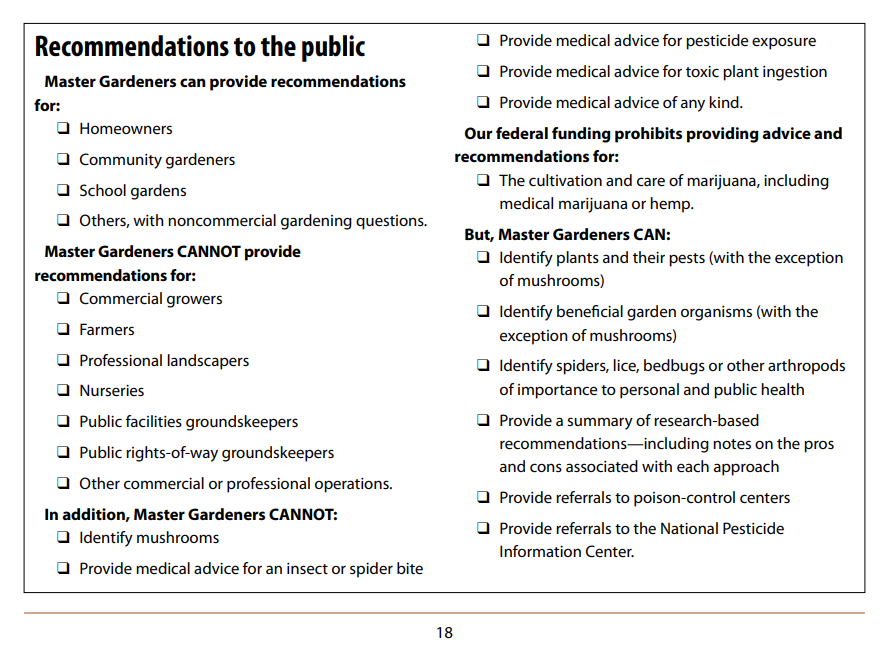Updates from the Statewide Master Gardener Program
- MG Instructor Database: for those of you searching for instructors for your 2019 MG classes, please remember that the list of MG instructors is annually updated, and housed in the ‘Master Gardener Program’ on Box. If you need access to this folder, please let me know. Specifically, the Excel file with the list of MG Instructors is in the sub-folder called ‘MG Basic Training Resources’, which can be accessed via https://oregonstate.box.com/s/alop5gv86az1q5zjscomgghds1v4y2mn
- MG Core Courses: Signe Danler recently sent out a information on how to access online Master Gardener modules, to supplement your in-person MG trainings. The required classes for MG training (Oregon MG Program, Botany Basics, Understanding Pesticides) are FREE for use. Other modules are available on a sliding scale ($50-$150 per module). If the sliding scale is out of your range, but you are interested in using an online module, please let us know. We charge a modest price to help cover basic program costs, but want to be flexible for counties without resources.
- MG Re-certification Stickers: I have 2019 Re-certification Stickers to send out for veteran MGs who have completed at least 10 hours of continuing education and 20 hours of approved volunteer service. If you have not already done so, please let Gail know (via email) how many stickers you need for your Master Gardener Program. They will go out in next week’s mail.
- Best Management Practices for MG Plant Sales: I have received feedback on our first draft from our task force. My goal is to synthesize all comments into a revised draft, by the end of this week (October 12th).
- 2018 CHAP Update: The 2018 Consumer Hort Advisory Panel came up with three recommendations to make annual MG trainings more fun, interactive, and accessible. These recommendations were to: a) move towards active learning in MG training classes; b) consider ways to keep costs low for MG trainings (scholarships, payment plans); c) lower the minimum number of required volunteer service hours for new MG trainees, to 55 or fewer hours. You can see the full description of recommendations on the hypertext entitled CHAP DRAFT Recommendations April 2018 on this page. At our working group meeting in July, recommendations 1 and 2 were adopted. Recommendation #3 received majority support, but there was still a lot of concern related to this recommendation. We are thus tabling this third recommendation, for the moment.
- Working Group Innovation Grant Funded: Several Home Hort working group members advanced a proposal for a two-day retreat, to carefully consider what changes are needed to build a more inclusive EMG Program, but also how to implement change. Our Innovation Proposal for the Home Hort Working Group was funded!!! We are targeting May or June for the actual two-day retreat. Keep an eye out for the first step in this effort ~ a survey of MG coordinators.
- Fall OMGA Newsletter: The fall issue of the Gardener’s Pen Newsletter has been published and posted online. Please make sure that your Master Gardener volunteers have access to this statewide MG newsletter.
- 2019 International Master Gardener Conference (IMGC): If you will be attending the 2019 IMGC (June 16-21, 2019 in Pennsylvania), the room block is now open for reservations. Registration is not yet open, but the full slate of speakers and tours has been posted.
- Professional Development Opportunity, “Achieving the Extension Mission through Volunteers“: an instructor-led, online course offered by the University of Minnesota. This course has received positive reviews from other Extension Master Gardener coordinators. The cost is reasonable ($250), but the timing coincides with Oregon’s Master Gardener training. Topics include ‘Identifying and Recruiting Volunteers’, ‘Selecting and Matching Volunteers’, ‘Supporting Volunteers’, and ‘Communicating Public Value’. If you are interested in taking this course, but cost is an issue, please let Gail know.



